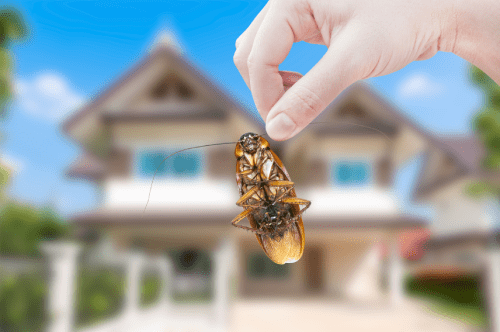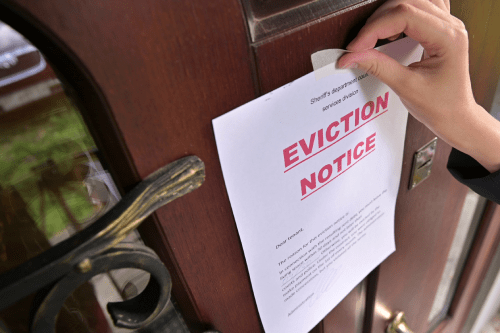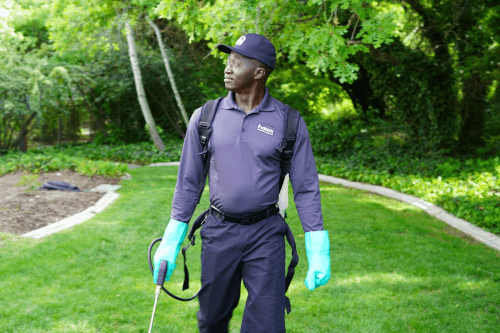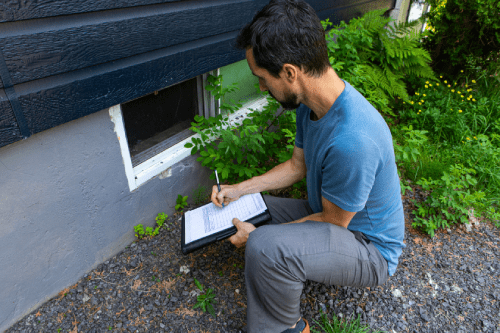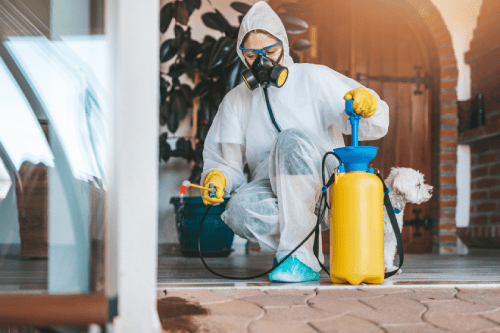Home / Blog / A Landlord’s Guide to Pest Management in Rental Properties
A Landlord’s Guide to Pest Management in Rental Properties

Scientifically reviewed by Daniel Baldwin, BCE, CCFS, CP-FS
-Published on October 24, 2022
-Updated on September 19, 2023
Pests in a rental property can cause conflict between tenants and landlords. With over 16 million American homes reporting seeing cockroaches or rodents in 2020-2021, landlords and housing managers have received many distressed or angry calls.
As experts in pest control, we’ve put together a helpful guide to pest management in rental properties for landlords and property managers. From who is responsible (and should pay) for pest control to how to tackle a pest infestation, protect your property and save money — find all the answers below.
Pest management – an issue that can’t be swept under the carpet
Pests don’t discriminate between single-family homes, suburban condos, or high-rise apartments. When you are a landlord or a property manager, sooner or later, you’ll be contacted about the presence of pests on your property. Regardless of who is responsible for the pest infestation, it’s crucial to address the situation quickly. If left unchecked, pests can cause structural damage to the property, recurrent complaints by tenants, possible turnover of renters, loss of revenue, and health issues for people and their pets.
Is pest control a landlord’s or tenant’s responsibility?
In rental properties, the landlord or property manager is responsible for pest control unless they can prove the tenant caused the infestation. However, each state has different legislation that you should refer to before turning down your tenants’ requests or taking legal action against them. You should also check if there was a pest control clause in the lease agreement you could enforce.
As detailed in the Uniform Residential Landlord-Tenant Act (URLTA), the landlord or property manager is responsible for keeping common areas in a clean and safe condition. Organizing rubbish bin collections and large pick-ups are part of the property owner’s responsibilities. Failing to keep the common areas free of rubbish can be used as ammunition by tenants, as unsanitary and untidy conditions can attract and harbor pests.
Who pays for pest control, the landlord or the tenant?
Once you have determined who is liable for pest control, the tenant or the landlord, the responsible party should cover the financial costs. If the landlord can prove that the tenants’ living conditions are responsible for the infestation, the bill falls to the renters. However, since time is of the essence, it’s better to cover the costs first and sort out the financial issue later if the tenants push back on paying for the extermination.
Preventative pest control in multi-family buildings is often an expectation and responsibility of HOAs and condo associations. If a pest control plan for the building isn’t in place, the tenants will likely use this to void any financial responsibility. So, if you manage or own an apartment block or large building, sign up for a regular pest control plan to safeguard your property and your finances.
Can you evict a tenant for causing a pest infestation?
In most U.S. states, you cannot evict a tenant on the grounds of being responsible for a pest infestation. You can charge them for the pest control intervention and issue a “notice to comply or quit” to warn them that they are in violation of the lease agreement and will be evicted if the situation isn’t fixed.
Check your State Laws, but, generally speaking, you will need to go to court and prove that living conditions are causing a health hazard or extensive property damage to evict a non-compliant tenant. As a landlord or property manager, you should consider alternative solutions to litigations first, as you will likely resolve the issue in a shorter timeframe.
What to do if your tenants report a pest infestation in the rental property?
So, you just received a distressed call from a tenant reporting ants, bed bugs, cockroaches, or other unsightly pests. What should you do next?
Can you take matters into your own hands?
If you are the building superintendent, property manager, or landlord, your first reaction might be to exterminate the critters yourself, but you would be breaking the law by doing so.
The U.S. Environmental Protection Agency (EPA) has specific regulations and laws around the use of pesticides in all settings, including residential properties. A person may only apply pesticides to the individual dwelling unit (e.g., house or apartment) in which they reside unless they are a certified commercial applicator. You should call a professional pest control company as soon as possible.
Organize a professional pest control visit
Regardless of who is responsible, your first action should be eradicating the pest. Always be prepared to front the bill for pest problems, so they are resolved quickly. A good rental property expense budget should always include preventative maintenance and emergency measures to avoid nasty surprises when fighting pest infestations.
During the process, keep the tenant informed of the progress in wiring. This way, if there is any dispute later on regarding the timeliness of your actions or communications, you will be standing on solid footing.
How much time does a landlord have to take care of a pest infestation?
It’s essential to act swiftly once you have been notified of a pest problem in your rental property. You should at least book the visit from a pest control company within one to two days. If you take too long, your tenant can take actions such as withholding rent, moving into temporary housing, or breaking the lease.
Even if you think you shouldn’t be paying for it, it is best to be proactive about the infestation. We recommend that you communicate in writing with the tenant to let them know that it is their responsibility to exterminate the pests and why. However, you don’t want to problem to go on unaddressed. Include a time limit in which they need to act, or you will book the pest control treatment and then pass the cost on to them.
How to reduce pest control costs in rentals
Preventing pest infestations is easier and cheaper than eradicating one. Here are three things you should be doing to keep your rental property pest free.
1. Regular visits and inspections
Inspect your rental properties at least yearly. Monitor the condition of the interiors and check for any entry points pests might use. If there is an outdoor area, ensure the vegetation is well-maintained, and you can’t see pest droppings on the ground. Tidiness and cleanliness are great pest-deterrents, and a landlord’s visit often results in the tenants doing a deep clean. If the area is prone to pest infestations or you have had issues with that property before, consider bringing a pest control specialist with you on these visits.
2. Pest prevention education
When signing the lease, talk to the tenants about their responsibilities and how they can avoid pest infestations. Forming a genuine connection during a face-to-face conversation helps them feel responsible for the property they live in, which can encourage tenants to take better care of the rental. When a new occupant moves in, it is the perfect time to go over scenarios in which they will be held accountable for any pest control cost incurred and which actions are to be avoided as they attract common pests.
3. Preventative pest control spraying
Don’t leave seasonal pest control up to the tenant. It might not get done at all or not to your satisfaction. Protecting your property from any serious damage caused by invasive pests is in your best interest. Put an agreement in place with your local pest control experts to regularly visit your property and prevent any pest invasion from developing. If you are working with or considering hiring a property managing agency, ask them what type of pest control they do. A small recurring expense can result in significant savings down the line.
Safeguard the landlord-tenant relationship
Happy tenants make for better renters. If your tenant reports a pest control issue in their living space, take immediate action and get professional help. From bed bugs to ants, cockroaches, flying insects, and other pests, the property owner or manager is usually financially responsible for exterminating the infestation. A proactive approach with regular maintenance, integrated pest management, and a service plan from your local pest control company is bound to save you money and headaches.
Disclaimer: The information provided in this article does not, and is not intended to, constitute legal advice. It is for general purposes only, and we offer no guarantee of its completeness, accuracy, usefulness, or timeliness. It is your responsibility to check current state and local laws for pest control management.
Related Articles
Visit our blog to learn more.
→
